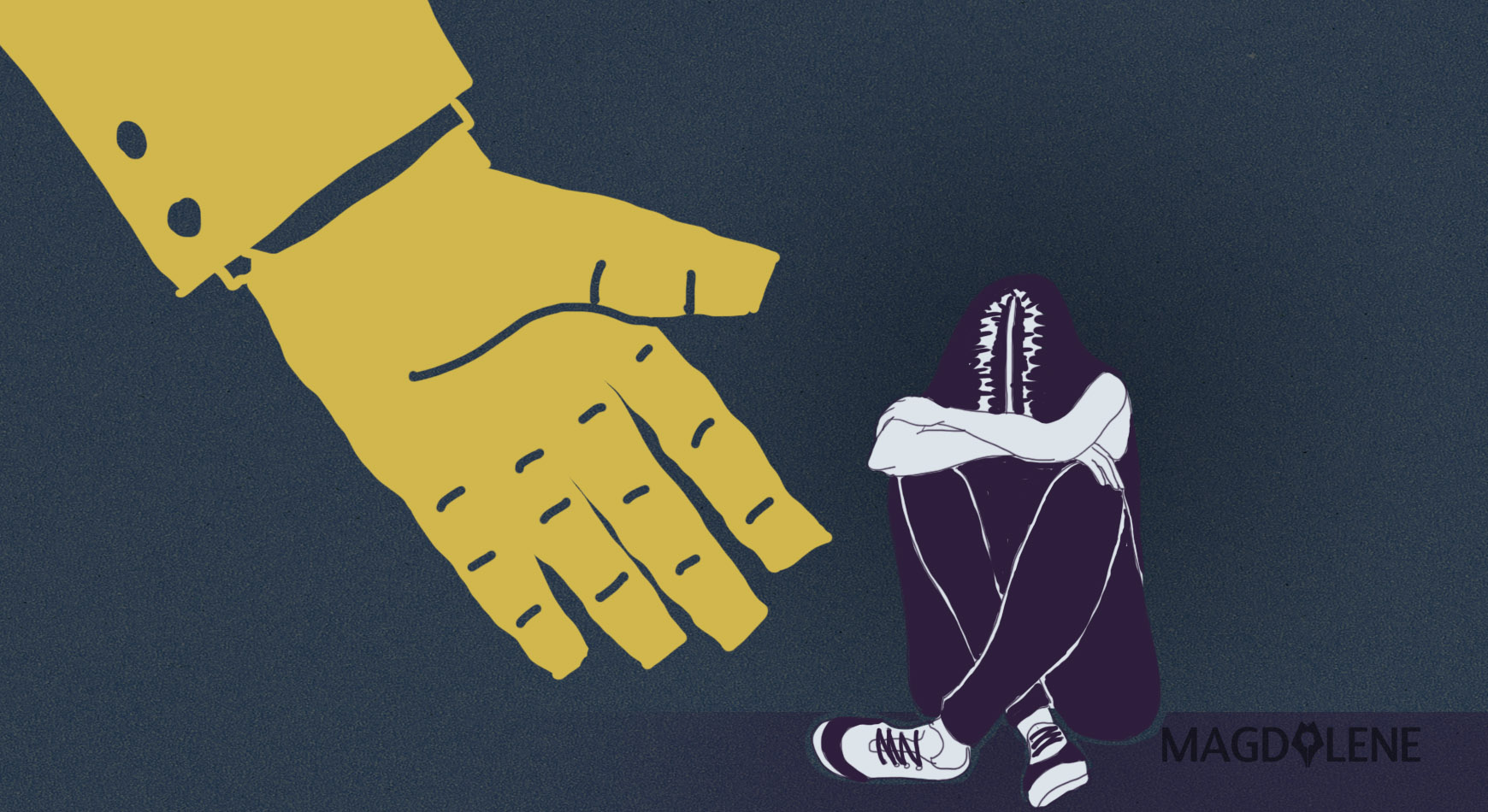Can men be caregivers of female victims of sexual violence?
This was a question asked during the monthly masculinity learning forum held by Aliansi Laki-laki Baru (ALB) or the New Men Alliance on Oct. 10. Held at Coffeewar, the discussion was moderated by Rendra Yoanda from Yayasan Pulih with two “learning friends” Syaldi Sahude from ALB and Charlie Chris Evan from One Billion Rising.
Syaldi shared his first experience as a caregiver of a 15-year-old girl who was a victim of an incestuous rape that got her pregnant. As somebody who had neither prior knowledge nor experience on the matter, he was very cautious at first. His first move was making sure that the victim was not traumatized by men.
“In the beginning, I kept a safe distance from her, because I was afraid that her trauma might make her fear being around men. Then my girlfriend jumped in to talk to her, and it turned out she didn’t have any problems with men, so I started from there,” Syaldi shared.
What to do once you get the green light?
“I waited for her to open up to me then I listened to her stories.”
Syaldi emphasized that it’s important not to ask the victim to recall the chronology of the assault, the name of the abuser, and the overall details of the assault. Do not scratch the wounds; wait until the victim is really ready to open up.
He said that most of the time, the victim tended to blame herself for what happened, so he had to constantly show his support and encourage her.
“Keep convincing her that it is really not her fault,” he added.
One of the participants, Tika, also shared her experience in caring for a sexual violence victim. She recalled a fatal mistake that should be avoided by everyone at all costs.
“I think one of the most important things while listening to their stories is keeping your emotions intact. Don’t get carried away and pour gasoline to the fire,” she said.
Once she got really angry at a media organization that reported her client’s case inaccurately. She tweeted about it emotionally, only to find out later that her tweet was read by her client. The client read the said inaccurate report, had a mental breakdown, and almost committed suicide.
“That is the worst mistake you could ever do. If I didn’t roar on Twitter, she would’t have found out about the article,” Tika said.
Then there is the emotional factor.
“Most men are easily triggered,” Syaldi said.
“While I was listening to my client, I got really angry, I felt the urge to finish the bastard. But, no, it wouldn’t have been wise to show my anger in front of her. I should remember that my reactions would affect her, so I had to learn to calm myself down,” Syaldi added.
Charlie also points out that when we’re listening to a story, we should never act like a know-it-all. Only “help what you can, based on your capabilities," he said.
“When you’re listening to them, you’ll feel tempted to spill out all of your wisdom, life advice and suggestions. Though it’s based on good intentions, you should not say anything that is not within your capacity. Your job is not to tell them what to do, but to help them to be in charge of themselves again,” said Charlie.
Tika described her experience: “Once, I was asked to help a victim who showed some indications of schizophrenia. It’s not my field of expertise, so I could not just tell my assumptions to her parents, as if I were capable of making a diagnosis. What I COULD do instead was find her an expert on that particular field.”
The Importance of a Good Gender Perspective
The forum agreed that an important criterion to be an ideal caregiver is having a correct gender perspective.
“I used to work as an advocate. I witnessed how investigators, policemen, basically everybody in the law enforcement, often in a joking manner, would ask women victims something like: ‘Are you sure, it’s not you who started it?’, or ‘What’s the color of your underwear at that time?’, or ‘You must have enjoyed it as well, didn’t you?’” he recalled.
Worse, it wasn’t just men making these awful remarks, women investigators did too, he added. Most law enforcers still tend to side with the suspects, not the victims.
“Tough luck, which was why I quit my hopeless job as an advocate and joined One Billion Rising instead,” he said.
The most important thing is: Stop victim-blaming!
“If the first thought that comes to your mind while handling a case of sexual violence is questioning the victim’s clothes and so on, you better back out for good,” Syaldi explained.
In a deeply rooted patriarchal society, it’s nearly impossible for wives to report her husbands for rape since a woman’s job is believed to fulfill whatever it is her husband’s needs.
Charlie recalled accompanying the case of a wife who was raped by her husband, and was told by a policeman: “Don’t be like that; he is your husband, right?” The impunity enjoyed by perpetrators of violence is a bitter reality in Indonesia, where the law enforcement may interfere by suggesting that the case be settled out of court “secara kekeluargaan” (in peaceful family manner), he said.
A participant asked what he should do to have a good gender perspective.
Syaldi told him to keep an open mind and get as much exposure as possible on gender issue.
“Attend seminars or workshop that talk about gender issue. You may also stalk our website as a start. Try some books, such as Women at Point Zero by Nawal El-Saadawi, Feminism for Everybody by Bell Hooks, or The Second Sex by Simone de Beauvoir,” he suggested.
One of the participants Khalila said she learned a lot from the discussion: “One input that I found very useful in this session is about what to do while being asked for help that is beyond our capacity.”
“Often I was put in a situation where I am not capable of giving answers. My friends would ask me what’s the right thing to do. Usually, it’s either I ended up being confused with them or gave them some baseless advice. Now I know that I could actually direct them to meet somebody who can help, an expert or someone who shared similar experience with them,” she added.
Read Ayunda’s piece on a documentary that gives voice to rape victims.









Comments